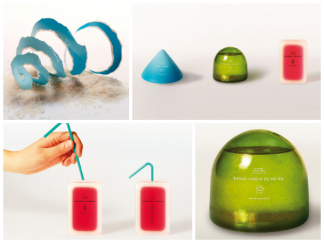A Swedish design duo are developing a biodegradable, cellulose food wrapper that cooks your food, morphs into a bowl, and can be dissolved in water or tossed on the compost heap when you're done.
Think about how much food packaging you throw out every day. That plastic sushi wrapper. The container your yoghurt came in. The plastic bag that held your grapes in one place, and the sachet that contained the sugar that you just poured into your coffee. We take for granted how much packaging our food is wrapped up in, and it's having an enormous effect on our environment.
So Swedish designers Hannah Billqvist and Anna Glansén from a group called Tomorrow Machine are creating a product called the 'Sustainable Expanding Bowl'. This biodegradable, cellulose wrapper can be used to contain all kinds of freeze-dried food. All you need to do is pour some hot water through the wrapper's 'spout', and it will cook the food inside, and cause the wrapper to soften and expand out into a bowl shape. Once you're done with it, the packaging will wither, allowing you to dissolve it in water or throw it on the compost heap.
Tomorrow Machine has come up with three products for their prototype design - Basmati rice, olive oil, and a raspberry smoothie. "The good thing about plastic is that it does not react with other materials very easily," Glansén told Margaret Rhodes at Wired. "But that is also the bad thing about plastic, because it means that it makes the natural decomposition process difficult."
So Tomorrow Machine has come up with a solution for their packaging - it has the same shelf-life as the food it contains. Rhodes explains:
"The trick to making that possible lies in finding material combinations that don't react to each other. The olive oil, for example, comes in a wax-coated caramelized sugar container. But that couldn't work with the smoothie, because water breaks down sugar. But the smoothie or fresh fruit juice could come in an agar seaweed gel container. Once it's un-refrigerated, 'the package will wither at the same speed as its contents'."
The packaging is expected to be on supermarket shelves in five years or so, but in the meantime, the design pair will be releasing another product called a Microgarden. This miniature paper greenhouse uses agar seaweed, says Wired, which helps people to grow micro-greens and herbs for use at home.
Source: Wired
